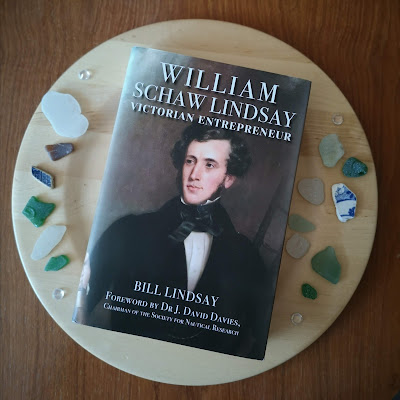This book sits on the very edge of the time period I usually write about, which is late Georgian through the Regency. William Schaw Lindsay was born in the middle of the Regency, but almost his entire adult life was during the reign of Queen Victoria.
However, its appeal to me was the business angle. Early Victorian commercial life was not that different to that of the Regency period. Neither was life aboard a merchant ship, which William Schaw Lindsay experienced and described, during the 1830s.
Victorian entrepreneur
In 1833 William Schaw Lindsay was an unemployed 17-year-old living rough in Liverpool docks. An orphan, far from his Scottish home, he applied to ship after ship for work. Time after time he was refused, sometimes violently.
In 1877, some 44 years later, William Schaw Lindsay was an invalid sitting beside the River Thames near London. Aged 61, he’d been unwell for over ten years. But in the three decades between being alone in Liverpool and suffering a stroke, he transformed his life, and that of many others.
He rose from having nothing to becoming one of the world’s wealthiest ship owners, a Member of Parliament, and an influencer in maritime laws. He also wrote extensively, publishing his ‘magnum opus’ in the 1870s - the four volume History of Merchant Shipping and Ancient Commerce.
A lively biography told as if by Lindsay
The author, Bill Lindsay, is descended from the ship-owning entrepreneur featured in the book.
The introduction states:
Lindsay’s journal provides fascinating first-hand insights into merchant shipping in Victorian days, mismanagement of the Crimean War, and European involvement in the American Civil War.
The author has chosen to adopt what I consider to be an unusual approach. William Schaw Lindsay’s birth is written in the third person, but the story quickly flips to being told in the first person.
We’re told that all the information in the book is drawn from William Schaw Lindsay’s journals and other writings. However, there seem to be no direct quotes from those writings. The author has chosen to tell the story in the first person, based on these sources, but rewriting them for a modern audience.
This is understandable, given the Victorian prose style would not suit a 21st century audience. However, it means we rarely hear directly from William Schaw Lindsay himself. For me, as a lover of primary sources, this was frustrating.
That said, the tale is a lively one, particularly the opening sections that cover William Schaw Lindsay’s sailing days. He rose from ship’s boy to captain in just a few years, experiencing first-hand the rigours of sailing on a merchant ship in the 1830s.
Fascinating Stories from Victorian England
There are some wonderful stories inside the book. They’re enjoyable to read and could be useful to those researching life at that time. These include:
The drama of a parliamentary election in the 1850s. These were highly disruptive to the community. Crowds got drunk, windows and furniture were smashed, and coaches were overturned. The buying of votes was open, and the winning margins were slim.
Bride ships and coffin ships. The former were vessels employed to take batches of women to Canada, where there was a shortage of marriageable women. Coffin ships were sent to sea in an unseaworthy condition by owners hoping they’d sink, leading to an insurance payout.
Trials of the Crimean War. A number of William Schaw Lindsay’s ships supplied the British forces in the Crimea. He also adopted a dog that remained faithfully beside its dead Russian master, until it was removed by a British soldier. The war lowered his opinion of British military logistics - in just one of many errors it shipped 500 tables to the army but left all the legs in England.
The American Civil War. William Schaw Lindsay met Abraham Lincoln and many other American leaders in the years before the war. His shipping business meant he had a close interest in transatlantic trade, and as a Member of Parliament he had involvement with British government officials. He supported the southern cause.
A Classic Rags-to-Riches Story From Victorian England
It’s interesting to see, almost at first hand, how a penniless orphan became one of Britain’s leading shipping magnates. Of course, we’re hearing his version of the story, but there’s no boasting about achievements and no sense of thrusting ambition.
William Schaw Lindsay was one of those influential and well-connected Victorians who stood in the shadows of others. He met Queen Victoria, Abraham Lincoln, Isambard Kingdom Brunel. He was in Parliament with two of Britain’s most famous Prime Ministers - Disraeli and Gladstone. Through his journals he told his own story, and now we can read it.
The book contains several appendices, including a list of ships he owned, voyages of the Tynemouth during the Crimean war with details of cargo, and a list of his considerable property on his death.
William
Schaw Lindsay is published by Amberley and is available here.
If you have enjoyed this blog and want to encourage us and help us to keep making our research freely available, please buy us a virtual cup of coffee by clicking the button below.



No comments:
New comments are not allowed.